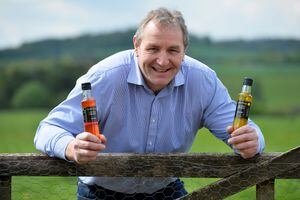Sowing seeds for big success
Bright yellow fields of oilseed rape have become a feature of the British countryside.

And on one Shropshire farm, artisan producers are transforming this popular crop into award-winning cold-pressed rapeseed oil.
Husband and wife team Rupert and Tracey Bennett, of Bennett & Dunn, have been making their own oil, dressings and infusions using traditional methods for the past four and a half years.
They are keen to spread the word about rapeseed oil’s many health benefits as well as its flavour and versatility.
“Our rapeseed oil has a great creamy, nutty flavour. It has the lowest saturated fat content of any culinary oil and less than half that of olive oil.
“It’s safe to cook with at a high temperature, unlike olive oil, so the flavour will never be impaired.
“It’s not at all greasy, as no good oil should be greasy, and it’s a completely natural oil as no preservatives or additives are added. It’s a high quality oil and it tastes great,” explains Rupert.
The idea for their business was first sown when the couple saw celebrity chef James Martin on his Saturday Morning television show using a rapeseed oil in a recipe.
“I’ve been in farming all my life and we were already growing rape so I thought we could try it. We did some research and founded the company. I’ve got a farming background and Tracey’s background is in sales so we brought those skills together.
Pressed
“Two months later we had pressed our first oil and it went on sale. We now sell to farm shops across Shropshire, AA rosette and Michelin-starred restaurants as well as through our online shop,” explains Rupert.
Around 50 acres of oil seed rape is grown just three miles from where the oil is pressed and bottled.
Every August around 70 tonnes of seed is harvested before being dried and cleaned and stored to keep it in perfect condition until processing.
“Some producers will harvest the seed and press all of their oil in one go. But we don’t do that, we store the seed and press it to order because that way it will always be fresh and the flavour will be the best it can be,” explains Rupert.
The cold pressing method is a traditional technique where a machine press squeezes the oil from the seeds.
“The seed is 46 per cent oil. There are no chemicals, no heat, it’s just a gentle process which retains the natural flavour of the oil. It’s as natural a product as we can make,” says Rupert.
The oil is stored in a tank where it’s allowed to settle for 10 days before it’s filtered three times through paper filters and then bottled by hand. Around 20,000 litres of cold pressed oil will be produced by the couple this year.
“It all starts with a quality seed. If you’ve got that, you will have a good quality oil. I taste the oil every day to make sure the taste is 100 per cent right,” says Rupert.
As well as their original cold pressed oil, they have dressings such as honey mustard and chilli garlic as well as infusions including Mediterranean herb and spice and natural lemon.
Bennett & Dunn, which also produces the Great Ness brand of cold pressed rapeseed oil, is proud to be a zero waste business.
It’s by-product, which is called rapeseed cake and contains all of the husks after the oils has been pressed, is sold to a local cattle farmer as animal feed. While any leftover oil is sent to be used for bio-fuel.
The couple are also hoping to develop a rapeseed husk croquette which could be burned on log burners instead of wood.
“The pressing doesn’t remove all of the oil from the husk so what is left is a renewable energy source. It will burn for longer and hotter than wood,” says Rupert.
Rapeseed oil has long been a chefs’ favourite but now more people are using it in their kitchens at home.
“It’s definitely a growing market. People are becoming more and more aware of what they are eating and where their food comes from.
“Rapeseed oil is better for you than extra virgin olive oil, it just doesn’t have a sexy name. But more people are becoming aware of it and the benefits it offers.
“Also, if you are buying from a supermarket you can’t ask the retailer or the producer any questions. If you buy from a smaller producer, you can ask questions and see where it’s produced,” says Rupert, who left farming two years ago to fully concentrate on their business.
The couple, who are based at Grange Farm in Hilton, near Bridgnorth, will spend 80 days at events such as food festivals and farmer’s markets throughout the year.
For Rupert meeting and talking to customers is a highlight of the job.
“It’s not just about selling bottles of oil, it’s also about getting the word out about our oil and talking to people about what we do.
“When I was in farming, I spent 99 per cent of my time on my tractor with my dog. We were producing all of this wonderful produce but we never spoke to anyone who was eating the food.
“Now I get to meet my customers, get their feedback whether it’s good or bad so we can make improvements and talk to people about what we do. I also get to work with my wife.
“People think we are a big company but there is just the two of us. People are surprised when I tell them that I put the top on their bottle of oil and I can tell them when I did it.
“I’m learning every day about talking to people and about food. It’s a lovely way to make a living,” says Rupert.
By Heather Large





